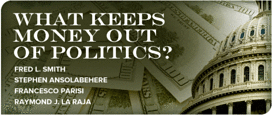I’m appreciative that Raymond J. La Raja has written a second commentary on this topic – so I’ll respond (hopefully with greater clarity) to the points he raised in his April 19 comment.
My intent in my original and second posting was not to argue that “business… cease lobbying like they are a business and start advocating like an ideological group.” Rather, I was arguing that in today’s mixed economy (about half private, about half political) business might have neglected profitable entrepreneurial opportunities in the political sphere that are actually wealth-creating rather than wealth-redistributing. I gave one example: the successful effort of the freight rail sector to gain economic liberalization.
That effort was in one sense incremental. Freight rail is but one element within the transportation sector and an even smaller element of the overall economy. However, for the firms involved in this sector, the changes were far from incremental. For the first time in decades, railroads could offer variant price/quality packages — innovations that required great improvements in rail operating efficiencies but that also yielded great value to the automobile and other industries. Many forms of government intervention in the economy (but certainly not all) are sectorial rather than economy-wide. I agree with La Raja that taking on these economy-wide regulations will be far more difficult.
La Raja says that I’ve underestimated “the success of free market promoters,” but I disagree. I do, of course, agree that in the War of Ideas (the debate within the intellectual class) classical liberal ideas have made gains. Rather, as I’ve noted in an another piece, I think Hayek’s point that “ideas have consequences” fails to stress that his analysis applies to bad ideas too. Hayek said little about how ideas become policy. I argue that that narratives must be crafted and disseminated that would legitimize the policies stemming from those ideas to the diverse values of our heterogeneous citizenry. (Thoughts on how this might be achieved are discussed in a paper by The Yale Law School Project on Cultural Cognition.)
To date, I believe that process has been mastered far better by those favoring a larger role for government than by classical liberals. As evidence, I note that for the last 130 years, with some mild and temporary reversals, government has steadily increased its dominance of the economy. The Constitution was (and is) a wonderful document with many checks and balances but it has certainly not proven adequate to restrain the growth of government. So, “stasis” is scarcely the term I’d use to describe the political trends of the last century.
La Raja correctly sees my focus on narratives, narratives, narratives! Democratic market economies require that policies gain a degree of support from the citizenry. They must be seen as morally acceptable as well as economically beneficial. He is right again that too many free market advocates “write with a limited conceptual palette.” This fact is beginning to be realized, as Deidre McCloskey’s work on bourgeois virtues and society shows.
He doubts that a counter-reformation for economic liberty is likely to succeed—a theme he developed in his earlier contribution. We differ on several points, as my last post noted, but revisiting some of those points is perhaps worthwhile.
The Media: La Raja earlier noted that a massive financial investment to liberalize the economy would likely trigger a flurry of media stories and that such an effort would backfire and be seen as an attempt to “buy Congress.” Yes, he’s right, but only if it were done that clumsily (and given the quality of past business and conservative attempts to influence policy it well might be), but the public choice concept of “Baptists and Bootleggers” addresses this point. My claim was that it might be possible to craft an alliance of entrepreneurial businessmen who could exercise their wealth-creating skills more effectively in a liberalized world and intellectuals who would be able to craft narratives that might legitimize such reforms. Those favoring the growth of the state have been successful using such tactics to overcome the status quo. Is it impossible that classical liberals might do the same? Still, the cautions given by La Raja are certainly appropriate.
One minor point: La Raja suggests that voters may or may not be rationally ignorant but certainly are “risk averse.” Markets create “winners and losers.” I would agree in part, but America remains (at least compared to Old Europe) far more optimistic about innovation. There was no significant opposition to freight rail liberalization. Moreover, this favorable view of innovation reflects a more positive view of “creative destruction” and a realization that all innovations introduce new risks but can also reduce older risks. We’re in a risk/risk world, and I do think that Americans are more aware of that reality than La Raja suggests.

